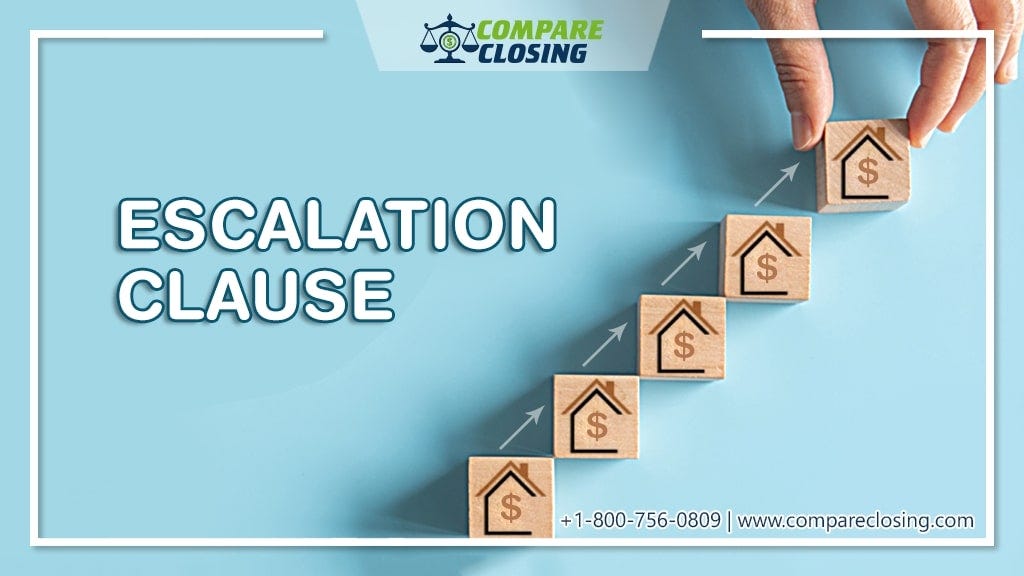
Introduction to Escalation Clause
In a seller’s market, getting your offer accepted could be a difficult task for a buyer. As a buyer sometimes it may be difficult to understand where you should start and where you should end.
There is one way where you may be in a situation to win the bidding war when you are planning to buy your home known as an escalation clause. In this post, we will understand what is an escalation clause in detail.
What is an Escalation Clause in Real Estate?
If you are a buyer in a seller’s market, you would be in a very competitive situation. In a situation where you like a property that you want to buy, however, there are multiple offers that you are up against, the question as a buyer remains, how high should you bid?
The escalation clause is a rider to the contract that can only be triggered in competition.
The escalation clause gives elasticity to a buyer’s offer, to incrementally help them beat and give higher net proceeds to the seller from competing offers. The idea is to raise the offer just enough to beat out the competing offers.
How Does an Escalation Cost Work?
There are three basic factors for an escalation clause:
- Escalation Factor: This is the incremental amount that you as a buyer would raise your offer to beat a competing offer. The question is how much should this escalating factor be? The escalating factor should be enough to get the seller’s attention from the other bidding offers to yours. In a seller’s market, a thousand dollars is not enough to get the seller’s attention. The escalation factor could be 0.5% to begin within a seller’s market which may go up to 2% of the listed price based on the competing offers. For example, if you are going to put an escalator cause on a home listed at $300,000, the escalation factor should be a minimum of $1,500 up to as much as $6,000. It is best to work with percentage as it would raise or lower the escalation factor depending on the listed price of the property.
- Cap: The cap is the maximum sales price that a buyer is willing to pay. The question here what is the maximum price you need to go up to? It is a difficult question to answer even for the best-in-class real estate agents. The cap is the number where you as a buyer feel comfortable spending for a home. If you win the offer at the cap of your escalation cap, you need to be happy and at peace. And if you don’t win the offer because another buyer bids higher, you need to be at peace at that time as well. Depending on your spending capacity to buy that home you can set a cap for your escalation clause.
- Transparency: In the escalator clause, the seller is bound to produce the competing sales offers to you if you are offering is being escalated. This means that the seller has to be transparent with the offers that he/she has received to justify your escalation clause. This way you can make sure that your escalation is not being misused by the seller or their agent.
Example of Escalation Clause in a Real Estate
Let’s say that you are interested in buying a home that is listed at $300,000. You as a buyer have the maximum cap of $325,000.
With the help of your real estate agent, you set an escalation clause mentioning the escalation factor of $2,000 (0.66% of the listed price) over the best-bided offer to $325,000. Let’s say that the top bid offer is $315,000.
Your escalated price in this case would be $317,000 which means you win the bid. If the best bid offer is $327,000, you are out of this bidding war as your escalation clause was capped at $325,000.
Conclusion
Escalation clauses in real estate are a fantastic way to compete in the seller’s market if planned well.
In a nutshell, you need to understand how high you can bid using the escalating factor, and set the highest cap for your escalation.
Whether you win or lose the offer, you need to have peace of mind with whatever outcome.
Your trusted real estate advisor would be in the best position to help you figure out the escalation factors and the cap depending on the home that you are planning to buy and your financial wealth.
https://www.compareclosing.com/blog/about-escalation-clause-in-real-estate/
Comments
Post a Comment